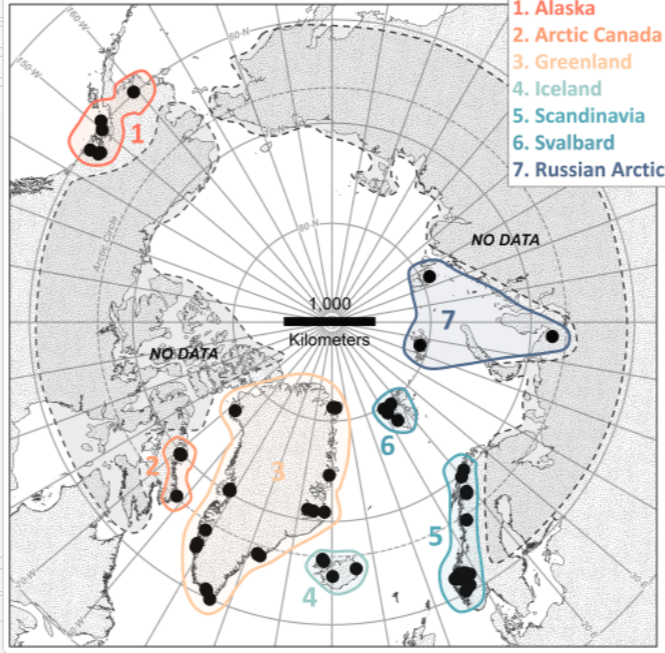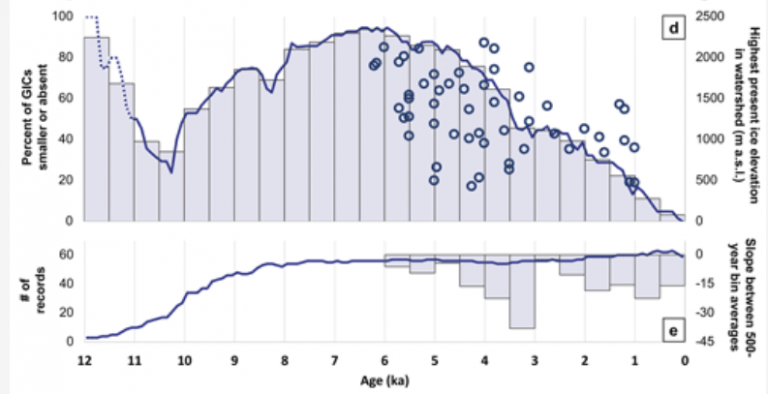Climate alarmists hate this inconvenient fact: hundreds of temperature reconstructions show that the northern hemisphere was much warmer over much of the past 10,000 years (Holocene) than it is today.
HAT-TIP: Klimaschau here
Massive 66 temperature reconstructions
One recent study: Arctic glaciers and ice caps through the Holocene: a circumpolar synthesis of lake-based reconstructions by Laura J. Larocca and Yarrow Axford, published in the journal Climate of the Past, examined the Arctic ice cap and glaciers over a large part of the Arctic:
Using a comprehensive sampling of sediment cores extracted from 66 lakes and seas, the scientists reconstructed the melting and expansion of the Arctic ice over the past 12,000 years.
What they found was that the Arctic was far warmer 6000 years ago than it is today.
Figure 10d: Arctic-wide summary of lake-based GIC records. The line shows the percent of GICs smaller than present or absent from 12 to 0 ka, calculated in 100-year bins. The dashed line shows time bins in which a low number (<10) of records were available. Bars show 500-year bin averages. Open dots show the timing of earliest GIC regrowth in the middle to late Holocene versus the highest present ice elevation inside the studied lake’s watershed. (e) The line shows the number of records from 12 to 0 ka. Bars show the slope between the 500-year bin averages (above) from the middle to late Holocene. More negative slopes indicate time periods with a higher number of GICs regrowing. Source: Larocca et al, 2022.
In the paper’s Figure 10d (above), the higher the curve, the smaller were the glaciers. Clearly we see that the Arctic region glaciers were much smaller 6000 years ago than today. Many in fact disappeared altogether and so summers were warmer.
The authors write:
We find the highest percentage (>90 %) of Arctic GICs smaller than present or absent in the middle Holocene at ∼ 7–6 ka, probably reflecting more spatially ubiquitous and consistent summer warmth during this period than in the early Holocene.”
Adding:
Our review finds that in the first half of the Holocene, most of the Arctic’s small GICs became significantly reduced or melted away completely in response to summer temperatures that, on average, were only moderately warmer than today.”







[…] New Study: Arctic Was Much Warmer 6000 Years Ago… 90% Of Glaciers, Ice Caps Smaller Than Prese… […]
Yes all true, but the conclusion engages in wild speculation: “Our review finds that in the first half of the Holocene, most of the Arctic’s small GICs became significantly reduced or melted away completely in response to summer temperatures that, on average, were only moderately warmer than today. In comparison, future projections of temperature change in the Arctic far exceed estimated early Holocene values in most locations, portending the eventual loss of most of the Arctic’s small GICs.” That last sentence is probably what allowed it at least in part to get through peer review and what also makes it impossible to use to use to refute today’s alarmists.
[…] From the NoTricksZone […]
[…] From the NoTricksZone […]
[…] From the NoTricksZone […]
[…] From the NoTricksZone […]
[…] From NoTricksZone […]
[…] NoTricksZone에서 […]
[…] “New Study: Arctic Was Much Warmer 6000 Years Ago… 90% Of Glaciers, Ice Caps Smaller Than Pres…” – Climate alarmists hate this inconvenient fact: hundreds of temperature reconstructions show that the northern hemisphere was much warmer over much of the past 10,000 years than it is today, says Pierre Gosselin on the No Tricks Zone. […]
[…] Read more at No Tricks Zone […]
[…] Learn extra at No Tips Zone […]
[…] From the NoTricksZone […]
“Climate alarmists hate this inconvenient fact: hundreds of temperature reconstructions show that the northern hemisphere was much warmer over much of the past 10,000 years (Holocene) than it is today.”
THAT STATEMENT IS FALSE.
My reading stopped immediately.
I also noted on the chart (map) that much of the Arctic Circle surface area is not well covered by these climate reconstructions
Climate reconstructions suggest the Holocene Climate Optimum, from 5000 to 9000 years ago, was likely to be slightly warmer than today’s climate (past decade). Given the low accuracy of climate reconstructions, and their local measurements, a better conclusion is that the climate optimum had a an average temperature similar to the average in the past decade. A more definitive statement that that one is speculation. Speculation is not science.
This so called study gets a thumbs down.
[…] Link: http://notrickszone.com/2022/04/10/new-study-arctic-was-much-warmer-7000-years-ago-90-of-glaciers-ic… […]
[…] Link: http://notrickszone.com/2022/04/10/new-study-arctic-was-much-warmer-7000-years-ago-90-of-glaciers-ic… […]
[…] Link: http://notrickszone.com/2022/04/10/new-study-arctic-was-much-warmer-7000-years-ago-90-of-glaciers-ic… […]
This is a robust climate proxy study in the Arctic affirming incontrovertibly that current warmer and rising temperatures are not unprecedented. They are nothing of the sort. Most of the Holocene has been warmer than now. A simple truth – here yet again affirmed by 66 glacial proxies – which continues to be stubbornly denied by alarmists, who repeatedly insist – contrary to evidence – that current warmth is unprecedented over “thousands” or “millions” of years.
However the authors’ contention is a reasonable one – that current warming and ice loss against the Milankovitch insolation forcing that would cause cooling and glacial increase instead – is evidence of anthropogenic warming. Possibly. But not necessarily. Climate dynamics are messy and chaotic with fractal signatures. And other interglacials like the previous Eemian, have had “brief”(a few centuries) warming peaks near their ending, running counter to longer term insolation-driven cooling and proving ephemeral, not preventing the eventual glacial inception.
Whether current warming and ice loss continue, or not, will make clearer the actual nature and causes of our current warming and ice loss that – one has to concede – are anomalous.
https://ptolemy2.wordpress.com/2020/10/14/rapid-warming-at-the-end-of-the-last-eemian-interglacial-caused-sea-level-to-rise-several-meters-just-before-ice-age-returned/